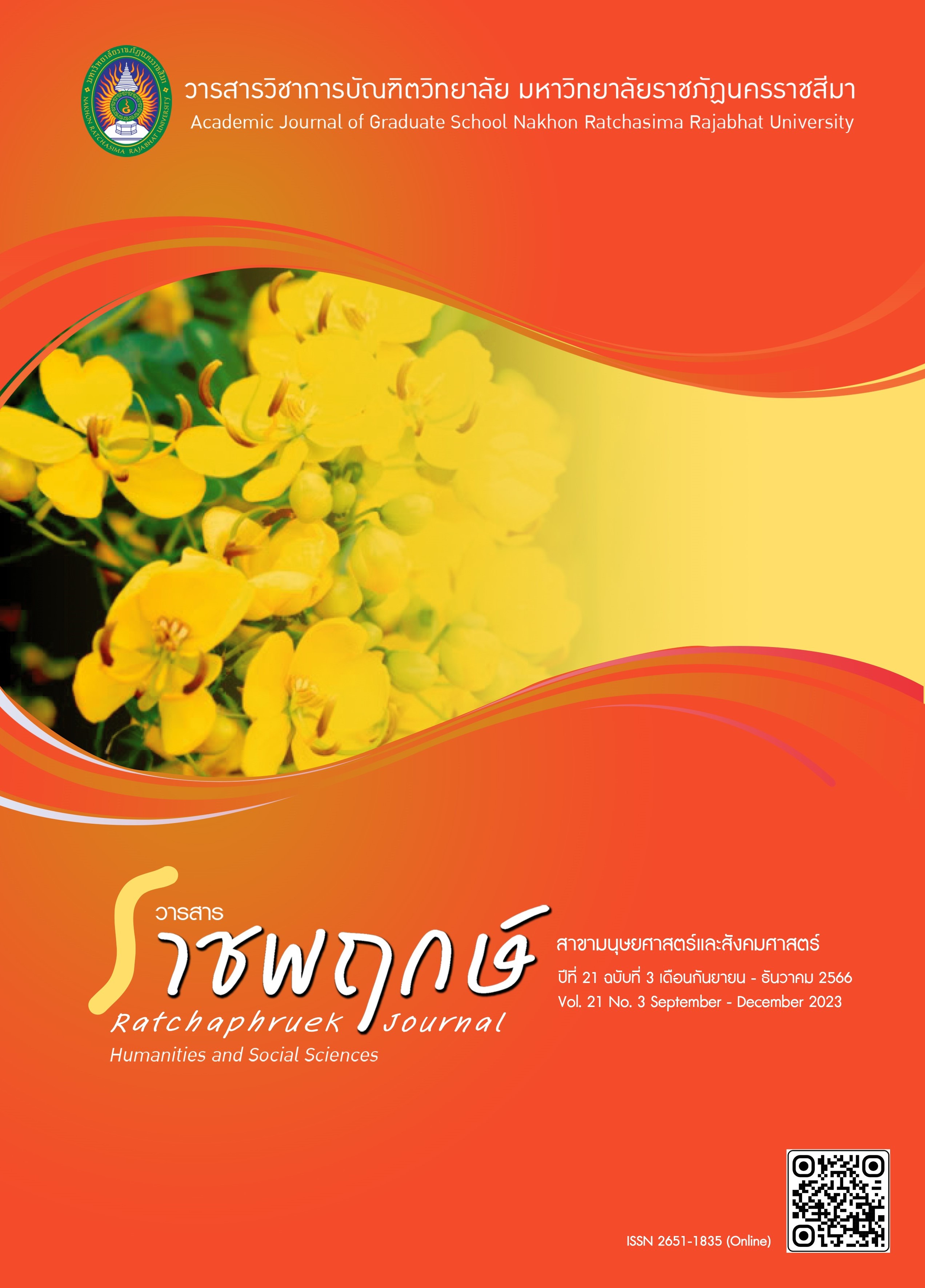Implementing WebQuest and Team-Based Learning Focusing on Thai Cultural Content to Promote the English-Speaking Ability of Grade 7 Students
Main Article Content
Abstract
The objectives of the study were to 1) investigate the effects of using WebQuest and Team-Based Learning focusing on Thai cultural content on English speaking ability and 2) explore students’ satisfaction towards learning English by implementing WebQuest and Team-Based Learning focusing on Thai cultural content. The population was 837 grade 7 students from private schools in Mueang Nakhon Ratchasima District in Nakhon Ratchasima Province. The samples were 26 grade 7 students from a private school in Mueang Nakhon Ratchasima District, Nakhon Ratchasima Province. They were selected by using cluster random sampling. The instruments used in the study were: 1) the lesson plans, 2) the English-speaking ability test, and 3) the satisfaction questionnaire. To analyze the data, the mean score (), percentage, standard deviation (S.D.), and t-test for dependent samples were used.
The findings of the study revealed that the student’s English speaking ability post-test mean score was higher than the pre-test one at a significant level of .05. Additionally, the students had satisfaction with learning English at a high level. The student’s English-speaking ability was also improved after learning by implementing WebQuest and Team-Based Learning focusing on Thai cultural content.
Article Details

This work is licensed under a Creative Commons Attribution-NonCommercial-NoDerivatives 4.0 International License.
References
Ashirbaeva, M. N. & Yusupova, M. A. (2023). Using the WebQuest task based on the development of speaking skills in 10th grade of the secondary schools in Bostonlik district. Finland International Scientific Journal of Education, Social Science & Humanities, 11(4), pp. 557-566.
Brown, H. D. (2001). Teaching by Principles: An Interactive Approach to Language Pedagogy. White Plains, New York: Longman.
Chorrojprasert, L. (2021). Learners' Perceptions on Peer Assessment in Team-Based Learning Classroom. Learn Journal: Language Education and Acquisition Research Network, 14(1), pp. 522-545.
Dodge, B. (1997). Some Thoughts about WebQuests. Retrieved October 10, 2021, from http://webquest.sdsu.edu/about_webquests.html
Dodge, B. (2001). Focus: Five rules for writing a great WebQuest. Learning and Leading with Technology, 28(8), pp. 6-9, 58.
Goodwin-Jones, B. (2004). Emerging Technologies: Language in Action: From WebQuests to virtual realities. Language Learning and Technology, 8(3), pp. 9-14.
Indrianty, S. (2016). Students’anxiety in speaking English (A case study in one hotel and tourism college in Bandung). Eltin Journal: Journal of English Language Teaching in Indonesia, 4(1), p. 31.
Joshi, T., Budhathoki, P., Adhikari, A., Poudel, A., Raut, S. & Shrestha, D. B. (2022). Team-based learning among health care professionals: A systematic review. Cureus, 14(1), pp. 1-12.
Kaenchai, K. & Jogthong, C. (2020). Effects of Implementing Constructive Roleplay through WebQuests on English Speaking Ability of 10th Graders. In Chutchalpolrut, A. (Ed.). The 8th CAS National and International Conference CASNIC & ESEC 2020 (pp. 1580-1596). Khon Kean: College of Asian Scholars.
Ministry of Education. (2008). The Basic Education Core Curriculum B.E. 2551 (A.D. 2008). Bangkok: Kurusapa Ladprao Publishing.
Nurhikmah, H. N. H., Hakim, A., Kuswadi, D., Sulfianti, S. & Sujarwo, S. (2021). Develop Online Teaching Materials for Science Subject During Covid-19 Era. Journal Pendidikan: Teori, Penelitian, dan Pengembangan, 6(8), pp. 1198-1206.
O’dwyer, B. (2021). 4 Benefits of Team-Based Learning for Students. Retrieved May 11, 2022, from https://www.blog.intedashboard.com/blogs/tbl-learning
Parmelee, D., Michaelsen, L. K., Cook, S. & Hudes, P. D. (2012). Team-Based Learninga practical guide: AMEE guide no. 65. Medical Teacher, 34(5), pp. 275-287.
Rinaldi, M. (2022). What is Team-Based Learning?: 4 ways it can help your group activities. Retrieved June 15, 2021, from https://feedbackfruits.com/blog/ what-is-team-based-learning
Rusmiyanto, R., Huriati, N., Fitriani, N., Tyas, N. K., Rofi’i, A. & Sari, M. N. (2023). The Role of Artificial Intelligence (AI) In Developing English Language Learner's Communication Skills. Journal on Education, 6(1), pp. 750-757.
Salem, A. S. E. (2017). The Effect of a WebQuest-Based Program on Developing the EFL Listening and Speaking Skills of Secondary Stage Students. Journal of Research in Curriculum, Instruction and Educational Technology, 3(4), p. 69.
Samad, A. A., Husein, H., Rashid, J. M. & Rahman, S. Z. S. A. (2015). Training English language preservice teachers using a Team Based Learning approach. English Language Teaching, 8(1), pp. 44-51.
Sangkhawasee, A. & Jansem, A. (2022). The development of English speaking ability for communication of Vocational Certificate students by Team Based Learning. Journal of Roi Kaensarn Academi, 7(4), pp. 223-232.
Santiwatthanasiri, T. (2018). Actors Affecting the English Speaking Ability of Thai University Students (Master’s thesis, Thammasat University).
Suwandi, S. (2021). Improving tenth grader’s English speaking fluency through Team-Based Learning. In Nygard, A. J. (Ed.). AICOLLIM 3rd Annual International Conference on Language, Literature, and Media (pp. 70-78). Canada: Simon Fraser University.
The Secondary Educational Service Area Office Nakhon Ratchasima. (2020). Number of students by class Academic Year 2/2021, Nakhon Ratchasima Secondary Educational Service Area Office. Retrieved July 25, 2023, from https://script.google.com/macro/s/AKfycbyL2o9es96lr364jzsToUq9Y8OENil9gGKyQ5aiVCJUY_oqxYZBclhPPmOPrsZl/exec
Tuan, N. H. & Mai, T. N. (2015). Factors affecting students’ speaking performance at LE Thanh Hien High School. Asian Journal of Educational Research, 3(2), pp. 8-23.
Wong, H. Y. (2015). Technology and its influence on education in the 21st century. Human Behavior, Development, and Society, 11(1), pp. 64-68.
Yaisoon, S., Rattanaviboon, P., & Chankao, C. (2016). Effects of team-based learning on knowledge and perceived learning outcomes in antenatal care of nursing students. TRCN J, 9(2), pp. 73-87.
Zheng, R., Perez, J., Williamson, J. & Flygare, J. (2008). WebQuests as perceived by teachers: Implications for online teaching and learning. Journal of Computer Assisted Learning, 24(4), pp. 295-304.


